Western Pastures – the latest farm conversion in Roscommon – has lit a match under dairy farming in the west of Ireland.
For one thing, the scale is big with almost 500 cows in one unit. The land, buildings and infrastructure are all top-class and among the best in the country.
But possibly the most interesting thing about the farm is that the business is owned by eight farmers.
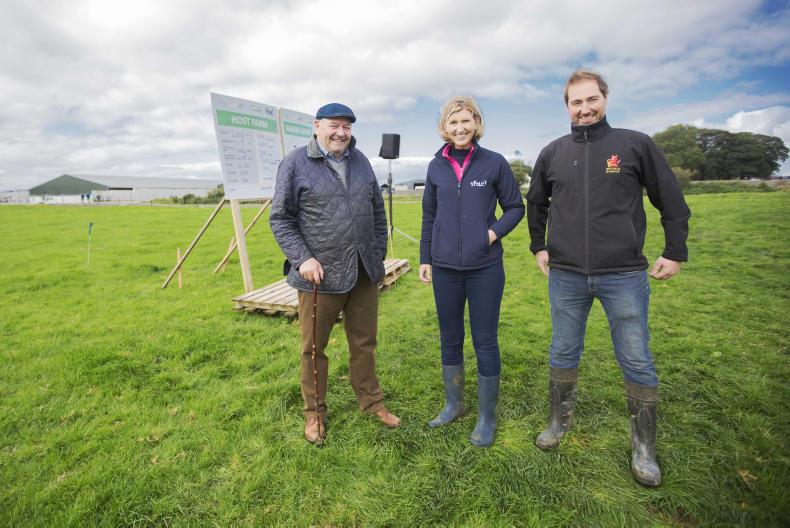
Farm owner Mick Bailey with one of the speakers,Noreen Lacey, ifac, and farmer Sean Coughlan, Lahardane, Ballina, Co Mayo. \ Brian Farrell
The farm is owned by the Bailey family who were prominent builders and developers during the Celtic Tiger era.
In total, there are 166ha in the farm with 119ha in the milking block. In late 2016, the farm was advertised for a long-term lease so the members of the West Awake Discussion Group visited it.
The group members are mostly based in Mayo and Sligo. Group member Timmy Quinn says the farm was in a fairly poor state but they saw that it had potential.
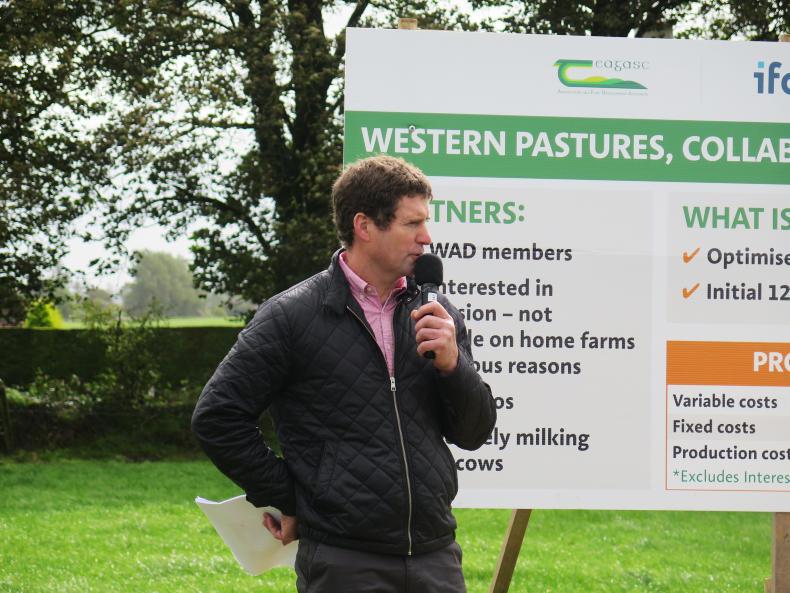
Timmy Quinn speaking at Western Pastures Dairy Farm, Castlerea, Co Roscommon.
A lease was signed between seven group members and their accountant, Martin Clarke from ifac in May 2017 for a 20-year term.
Considerable investment was required to convert the farm to dairy and no security was available for loans.
“That’s the challenge with leased land. There is no security so getting a traditional bank loan is not possible. Each of the farmers put up stock and cash so we have eight equal shareholders.
Finance was secured through the EII Scheme (tax-incentivised investment), unsecured bank finance, finance and leasing for plant and equipment and also private investors who are paid a commercial rate of return,” Martin says.
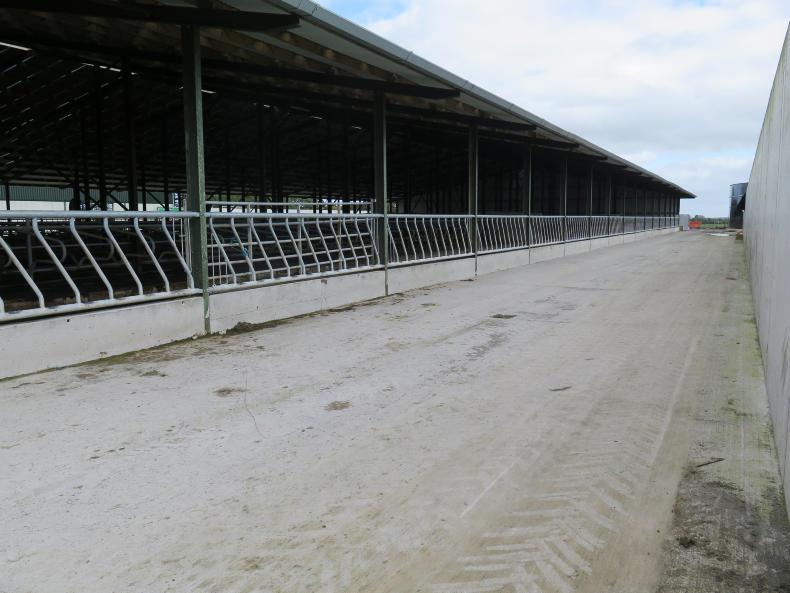
Western Pastures Dairy Farm, Castlerea, Co Roscommon.
A company was formed with eight equal shareholders. Timmy says that there is a co-op ethos within the company.
A chair and vice-chair were elected who oversee the farm and report back to the others.
“It’s a long-term investment with no return for the first 10 or 12 years. It’s a bit like buying a house in Roscommon and letting it out.
"The rental income will pay for the mortgage and when the mortgage is paid the house will start to deliver free cash except in this case we have invested in something we know and have a proven track record of delivery,” Martin says.
Investment
Investment has been made in farm roadways, grazing infrastructure, housing, slurry storage, milking parlour and silage pits.
A total of €1.49m has been spent to date with a further €84,000 earmarked for an underpass and upgrades to a calf shed. These figures are before grant aid and excluding VAT.
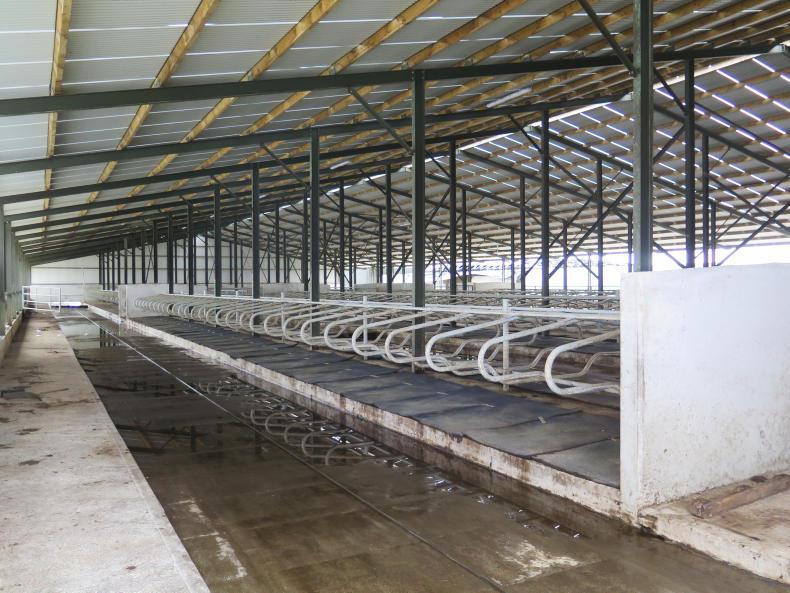
Western Pastures Dairy Farm, Castlerea, Co Roscommon.
The farm has been designed with 500 cows in mind. The 50-bail Dairymaster rotary parlour cost €892/cow.
The 480-cow cubicle shed and slurry tower and concrete tank cost €1,040/cow. Roadways (3.2km long and 5m wide), water, fencing and seeding cost €728/cow.
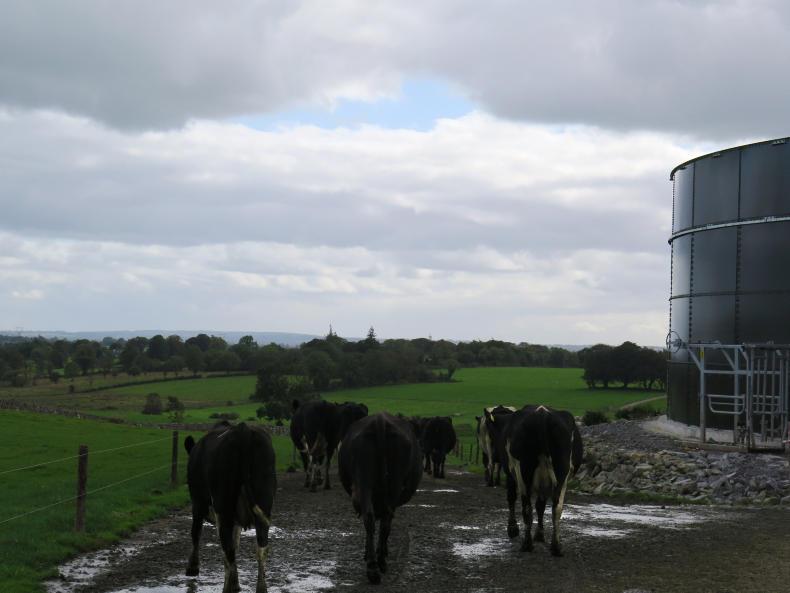
The silage slab cost €126/cow while electricity, planning and levies cost €168/cow. Of this, three-phase electricity cost €45,000 alone.
Sean Sweeney is vice-chair of Western Pastures. He says that they looked long and hard at the type of facilities they needed.
“We visited a lot of farms with various types of parlours but in the end we went for a rotary because we felt it was the best from a labour point of view.
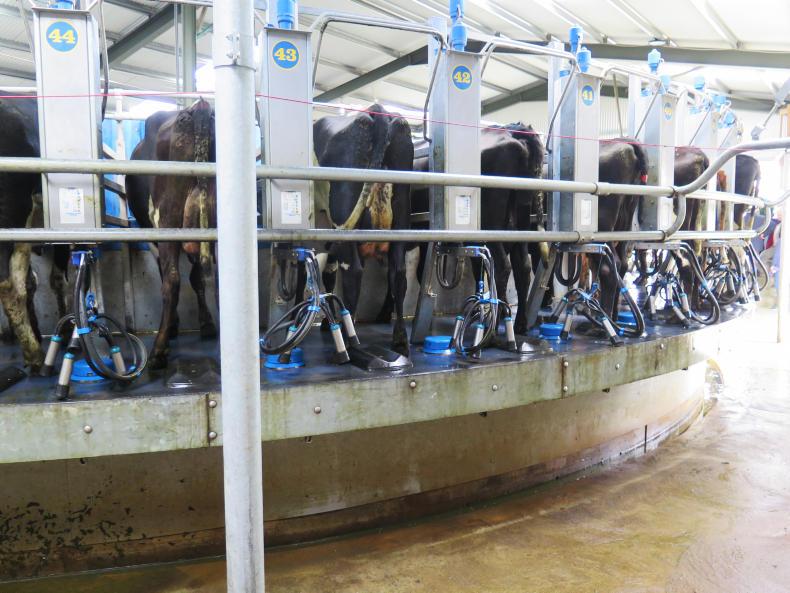
It’s very efficient and people like milking in it. While they are more expensive to build, we felt they were best in the long term,” Sean says.
Planning permission was lodged in May and was granted in October. Building work then commenced on the cubicle shed, rotary parlour, silage slab and slurry tower.
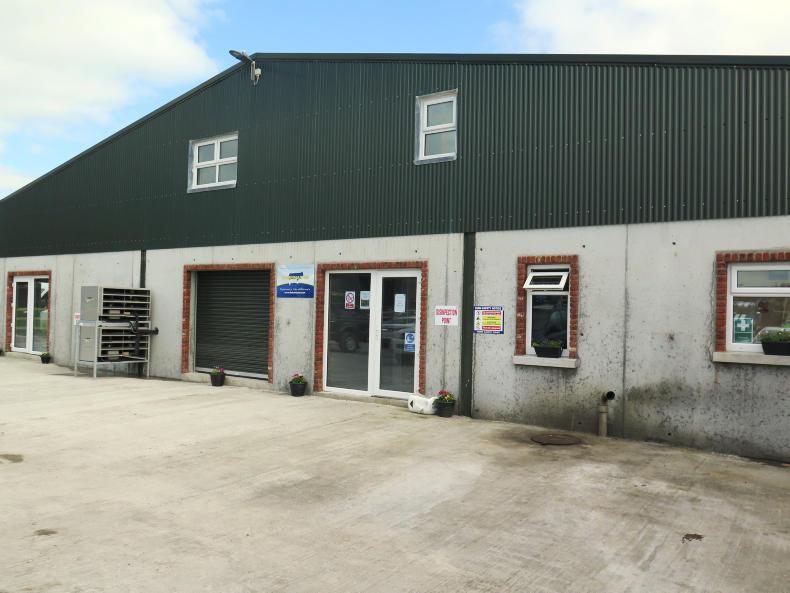
.
These were all built on a greenfield site adjacent to the existing yard. Roadways were constructed using stone quarried on the farm. Water, fencing and reseeding was all done by contractors and was completed by the end of 2018.
The parlour wasn’t ready for milking until 14 February, at which time 100 heifers had already calved.
The cows were milked once a day through a mobile plant until the parlour was working. The shed wasn’t completed until 10 March.
The milking cows were at grass by day and housed in the existing slatted sheds at night, which were scraped and limed daily.
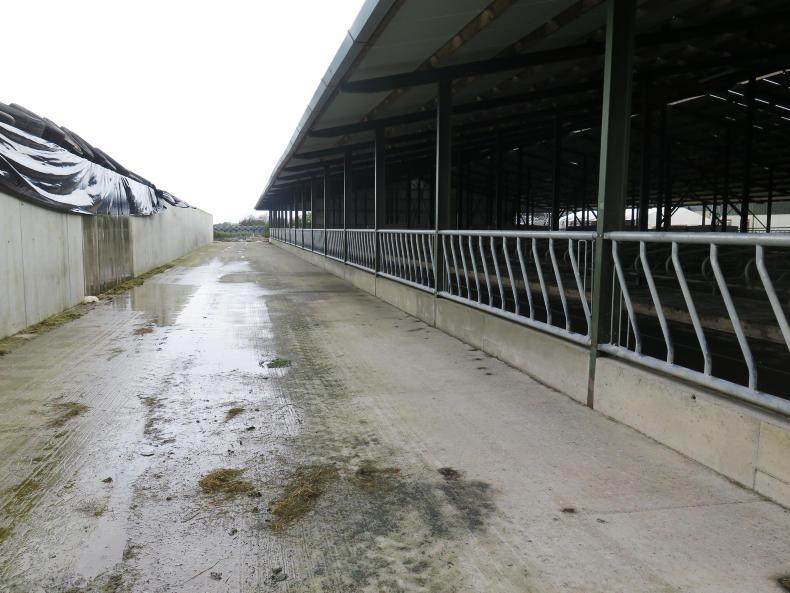
“Credit needs to go to the farm staff during that time. They worked very hard to get through that first spring with minimal losses and no mastitis,” Sean says.
“During the building phase, myself and Alan McCormick were on the farm at least twice a week.
"We employed good contractors to build the shed and the parlour so they knew what they were doing, which is important.”
Labour
Chair Alan McCormick spoke about labour on the farm. Martin Higgins is the farm manager. He initially started out as the night calver in the first year.
He is assisted by one employee who does three days a week, one weekend milker and two students in spring and summer. Martin is the third farm manager on the farm since 2018.
“The labour situation on this farm has a very different dynamic to our own farms.
"Each of the shareholders is living on average 1.5 hours away from the farm, so it’s never going to be the case where one of us can fall in if someone can’t do a milking or make it into work.
"We got in a HR specialist to put a structure in place and help out with the interview process.
“When we started we advertised for a manager and assistant manager but recruitment has been word of mouth since then,” Alan says.
Finances
Farm performance is excellent. The 430 cows have produced 347kg MS to date and are on track to produce approximately 440kgMS/cow this year.
The herd is all first and second calvers. So far this year, 13.5t/ha of grass has been grown and over 15.5t/ha should be grown before the year is out.
Stocking rate is high at 3.8 cows/ha on the milking block so meal feeding is on the high side at between 600kg and 700kg/cow.
Fat and protein is currently over 5% and 4%, respectively, with milk price received averaging 4c/l above the Aurivo average price for the year.
Despite this, the farm is on track to post a cash loss in 2019. In fact, no cash surplus is forecast for the first 12 years of the project.
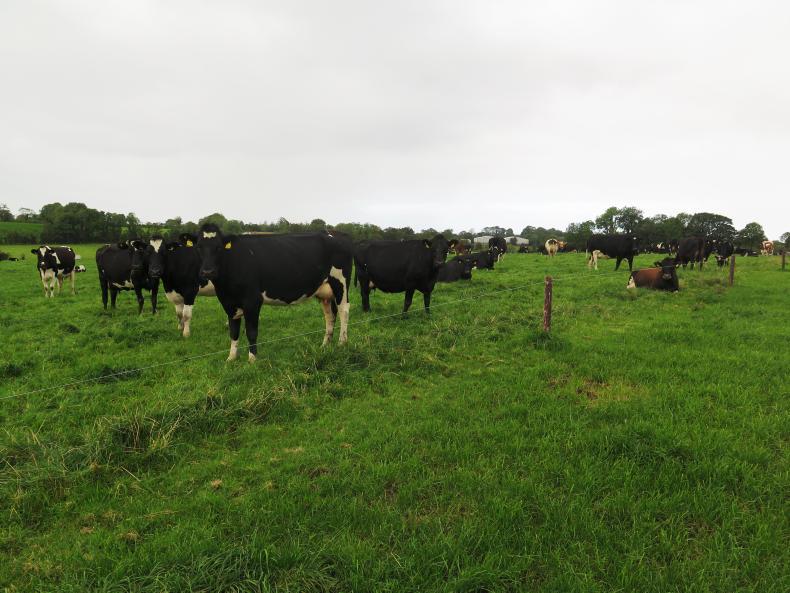
Cost of production, based on a mature herd output of around 480kg/cow, is 27.25c/l before interest, depreciation and capital repayments are taken into account.
“Let there be no illusions. This farm won’t make any surplus cash for the first 12 years. Our plan is to pay back debt for the first half of the lease.
“Any surplus cash generated next year will be used to build up a rainy day fund. Over the course of the lease, the return will be in the region of 8% to 10%,” Martin Clarke says.
Comment
The eight owners of Western Pastures should be commended for demonstrating what is possible in Roscommon – a county with some great tracts of land but only 118 dairy farms. The development of the farm is second to none.
But is this a good business model? No surplus cash is being generated, and there won’t be any until the debt is paid down in 10 or 12 years’ time.
The investors in the farm understand this. They are all running very profitable farms of their own and can afford to invest in a project that won’t deliver an immediate return.
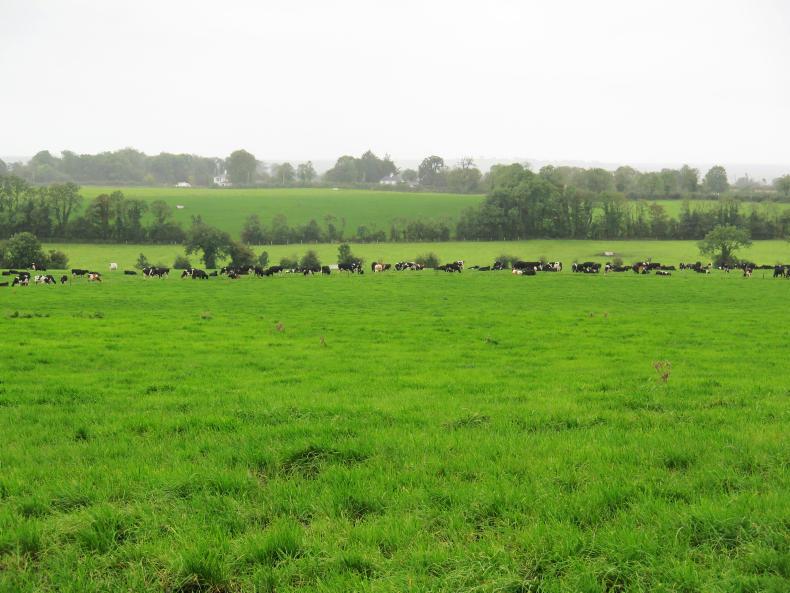
However, they are probably unique in that sense as most investors would be looking for a faster return.
Inevitably, comparisons are being made to the Greenfield Farm in Kilkenny. Western Pastures has the infrastructure that some would like to have seen built in Greenfield in year one, ie a rotary and a roofed cubicle shed.
However, the fact that capital expenditure in Greenfield was more basic and cheaper, went some way towards creating a cash surplus after year two.
This is despite the fact that milk solids per cow and grass growth were lower in Kilkenny. Generating free cash provides a level of safety and it gives options, such as giving employees profit shares, etc. That is not an option in Western Pastures.
To me, it just proves that you can’t set up a dairy farm on all leased land, all paid labour, all borrowed money and with high-end infrastructure and expect to make a quick return. It’s a long-term game.
Those considering getting into dairying should keep this in mind.
Read more
Thrive: coughing calves sparks investigation
Co-ops must not let Glanbia set their August milk price – IFA
Western Pastures – the latest farm conversion in Roscommon – has lit a match under dairy farming in the west of Ireland.
For one thing, the scale is big with almost 500 cows in one unit. The land, buildings and infrastructure are all top-class and among the best in the country.
But possibly the most interesting thing about the farm is that the business is owned by eight farmers.

Farm owner Mick Bailey with one of the speakers,Noreen Lacey, ifac, and farmer Sean Coughlan, Lahardane, Ballina, Co Mayo. \ Brian Farrell
The farm is owned by the Bailey family who were prominent builders and developers during the Celtic Tiger era.
In total, there are 166ha in the farm with 119ha in the milking block. In late 2016, the farm was advertised for a long-term lease so the members of the West Awake Discussion Group visited it.
The group members are mostly based in Mayo and Sligo. Group member Timmy Quinn says the farm was in a fairly poor state but they saw that it had potential.

Timmy Quinn speaking at Western Pastures Dairy Farm, Castlerea, Co Roscommon.
A lease was signed between seven group members and their accountant, Martin Clarke from ifac in May 2017 for a 20-year term.
Considerable investment was required to convert the farm to dairy and no security was available for loans.
“That’s the challenge with leased land. There is no security so getting a traditional bank loan is not possible. Each of the farmers put up stock and cash so we have eight equal shareholders.
Finance was secured through the EII Scheme (tax-incentivised investment), unsecured bank finance, finance and leasing for plant and equipment and also private investors who are paid a commercial rate of return,” Martin says.

Western Pastures Dairy Farm, Castlerea, Co Roscommon.
A company was formed with eight equal shareholders. Timmy says that there is a co-op ethos within the company.
A chair and vice-chair were elected who oversee the farm and report back to the others.
“It’s a long-term investment with no return for the first 10 or 12 years. It’s a bit like buying a house in Roscommon and letting it out.
"The rental income will pay for the mortgage and when the mortgage is paid the house will start to deliver free cash except in this case we have invested in something we know and have a proven track record of delivery,” Martin says.
Investment
Investment has been made in farm roadways, grazing infrastructure, housing, slurry storage, milking parlour and silage pits.
A total of €1.49m has been spent to date with a further €84,000 earmarked for an underpass and upgrades to a calf shed. These figures are before grant aid and excluding VAT.

Western Pastures Dairy Farm, Castlerea, Co Roscommon.
The farm has been designed with 500 cows in mind. The 50-bail Dairymaster rotary parlour cost €892/cow.
The 480-cow cubicle shed and slurry tower and concrete tank cost €1,040/cow. Roadways (3.2km long and 5m wide), water, fencing and seeding cost €728/cow.

The silage slab cost €126/cow while electricity, planning and levies cost €168/cow. Of this, three-phase electricity cost €45,000 alone.
Sean Sweeney is vice-chair of Western Pastures. He says that they looked long and hard at the type of facilities they needed.
“We visited a lot of farms with various types of parlours but in the end we went for a rotary because we felt it was the best from a labour point of view.

It’s very efficient and people like milking in it. While they are more expensive to build, we felt they were best in the long term,” Sean says.
Planning permission was lodged in May and was granted in October. Building work then commenced on the cubicle shed, rotary parlour, silage slab and slurry tower.

.
These were all built on a greenfield site adjacent to the existing yard. Roadways were constructed using stone quarried on the farm. Water, fencing and reseeding was all done by contractors and was completed by the end of 2018.
The parlour wasn’t ready for milking until 14 February, at which time 100 heifers had already calved.
The cows were milked once a day through a mobile plant until the parlour was working. The shed wasn’t completed until 10 March.
The milking cows were at grass by day and housed in the existing slatted sheds at night, which were scraped and limed daily.

“Credit needs to go to the farm staff during that time. They worked very hard to get through that first spring with minimal losses and no mastitis,” Sean says.
“During the building phase, myself and Alan McCormick were on the farm at least twice a week.
"We employed good contractors to build the shed and the parlour so they knew what they were doing, which is important.”
Labour
Chair Alan McCormick spoke about labour on the farm. Martin Higgins is the farm manager. He initially started out as the night calver in the first year.
He is assisted by one employee who does three days a week, one weekend milker and two students in spring and summer. Martin is the third farm manager on the farm since 2018.
“The labour situation on this farm has a very different dynamic to our own farms.
"Each of the shareholders is living on average 1.5 hours away from the farm, so it’s never going to be the case where one of us can fall in if someone can’t do a milking or make it into work.
"We got in a HR specialist to put a structure in place and help out with the interview process.
“When we started we advertised for a manager and assistant manager but recruitment has been word of mouth since then,” Alan says.
Finances
Farm performance is excellent. The 430 cows have produced 347kg MS to date and are on track to produce approximately 440kgMS/cow this year.
The herd is all first and second calvers. So far this year, 13.5t/ha of grass has been grown and over 15.5t/ha should be grown before the year is out.
Stocking rate is high at 3.8 cows/ha on the milking block so meal feeding is on the high side at between 600kg and 700kg/cow.
Fat and protein is currently over 5% and 4%, respectively, with milk price received averaging 4c/l above the Aurivo average price for the year.
Despite this, the farm is on track to post a cash loss in 2019. In fact, no cash surplus is forecast for the first 12 years of the project.

Cost of production, based on a mature herd output of around 480kg/cow, is 27.25c/l before interest, depreciation and capital repayments are taken into account.
“Let there be no illusions. This farm won’t make any surplus cash for the first 12 years. Our plan is to pay back debt for the first half of the lease.
“Any surplus cash generated next year will be used to build up a rainy day fund. Over the course of the lease, the return will be in the region of 8% to 10%,” Martin Clarke says.
Comment
The eight owners of Western Pastures should be commended for demonstrating what is possible in Roscommon – a county with some great tracts of land but only 118 dairy farms. The development of the farm is second to none.
But is this a good business model? No surplus cash is being generated, and there won’t be any until the debt is paid down in 10 or 12 years’ time.
The investors in the farm understand this. They are all running very profitable farms of their own and can afford to invest in a project that won’t deliver an immediate return.

However, they are probably unique in that sense as most investors would be looking for a faster return.
Inevitably, comparisons are being made to the Greenfield Farm in Kilkenny. Western Pastures has the infrastructure that some would like to have seen built in Greenfield in year one, ie a rotary and a roofed cubicle shed.
However, the fact that capital expenditure in Greenfield was more basic and cheaper, went some way towards creating a cash surplus after year two.
This is despite the fact that milk solids per cow and grass growth were lower in Kilkenny. Generating free cash provides a level of safety and it gives options, such as giving employees profit shares, etc. That is not an option in Western Pastures.
To me, it just proves that you can’t set up a dairy farm on all leased land, all paid labour, all borrowed money and with high-end infrastructure and expect to make a quick return. It’s a long-term game.
Those considering getting into dairying should keep this in mind.
Read more
Thrive: coughing calves sparks investigation
Co-ops must not let Glanbia set their August milk price – IFA















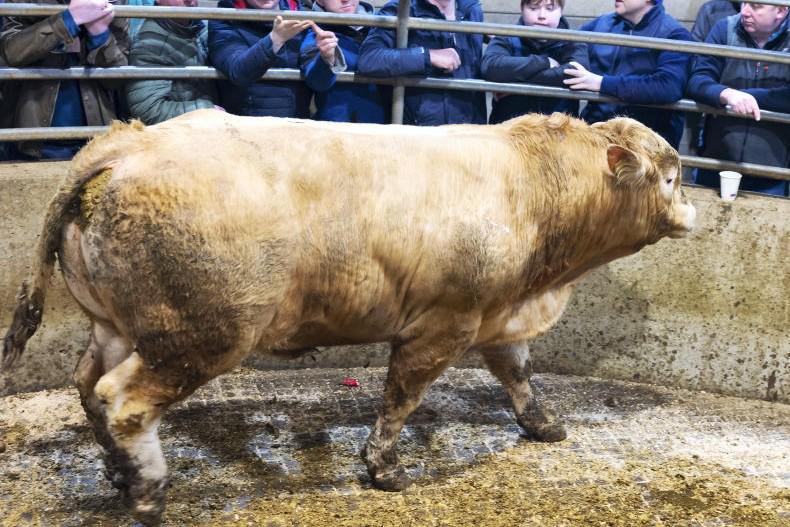

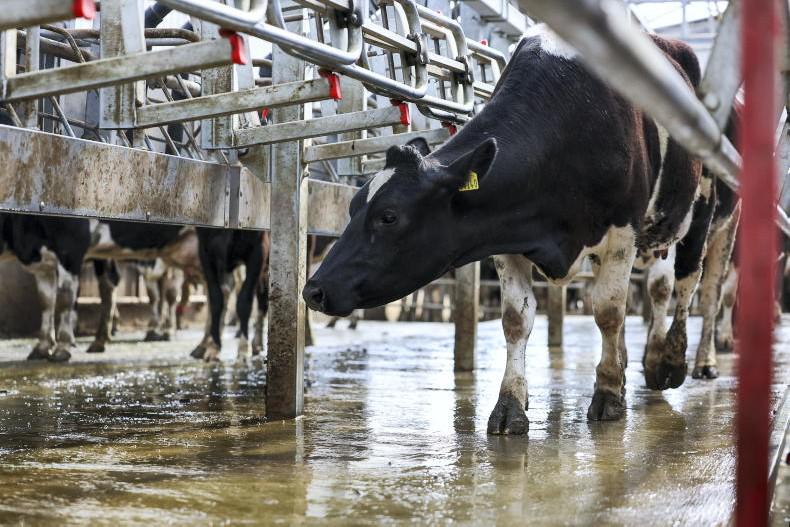
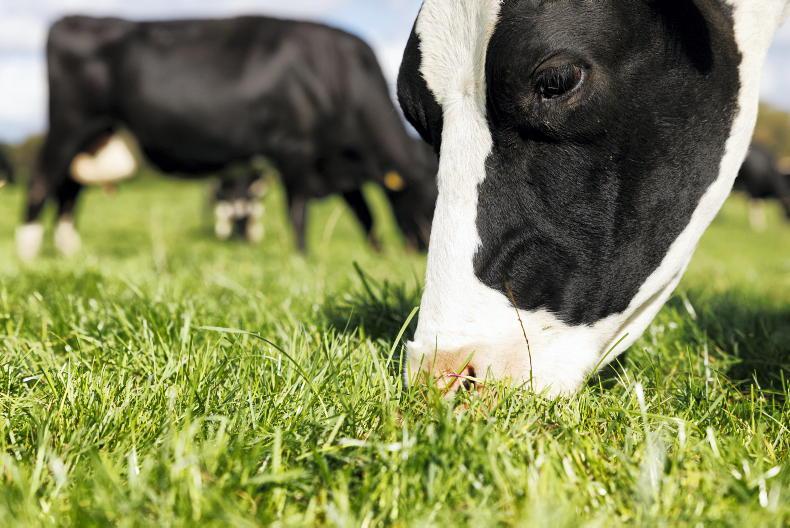
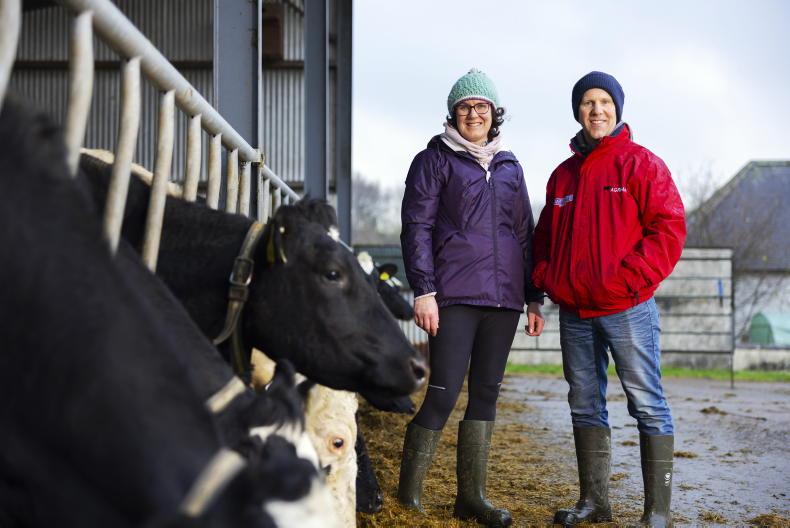
SHARING OPTIONS